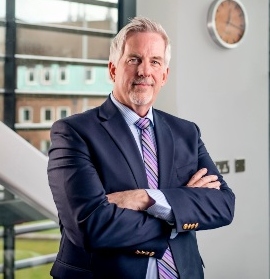Professor Rob Bristow: A once in a lifetime opportunity
Rob Bristow is the Cancer Domain Lead and Professor of Cancer Studies at The University of Manchester, and Director of the Manchester Cancer Research Centre (MCRC).

Manchester is a global powerhouse of basic, discovery and applied research. To my knowledge, there’s nowhere else in the world where cancer research is elevated and activated to such a high level based on the commitment of the University and its partners.
Professor Rob Bristow / Cancer Domain Lead and Professor of Cancer Studies at The University of Manchester
The Manchester factor
I came from Toronto to Manchester because of an incredible, once in a lifetime opportunity of being involved in developing a new strategy which joins clinical ideas and basic discovery research to help change how we treat patients.
Strengths in cancer research
The University is home to world-leading cancer research expertise spanning the full spectrum, from cancer prevention and early detection through to the molecular classification of patients for innovative clinical trials using radiotherapy, drug therapy or immunotherapy. There is also important research on living with cancer, including survivorship and minimising the effects of treatments.
With its partners the MCRC, Cancer Research UK, The Christie (Europe’s largest single-site cancer centre) and other Manchester-based health services, the University undertakes a collaborative programmatic approach to genomics which includes trialling genetic tests for clinical patients. We’re also creating a digital health record database showing how treatment affects patients and which records any side-effects by linking to their genomics. This will be a first real-world outcome protocol for the UK and will see Manchester become a world leader in electronic data which is married to a patient’s genetic make-up.
The University also has strong links with local National Health Service trusts, meaning our researchers work side by side with clinicians, taking research from the laboratory bench to the bedside and back again.
Manchester’s differentiators
Manchester is a global powerhouse of basic, discovery and applied research. To my knowledge, there’s nowhere else in the world where cancer research is elevated and activated to such a high level based on the commitment of the University and its partners.
Collectively, we’re changing the way we approach cancer biology to prevent, diagnose, treat and minimise side-effects.
We are driving international projects in early detection, cross-training of scientists and translational research in genetic instability.
Professor Rob Bristow / Cancer Domain Lead and Professor of Cancer Studies at The University of Manchester
Opportunities for international cancer researchers
The redevelopment of the Paterson Building next to The Christie, is an opportunity to create one of the world’s top five translational cancer-research centres and will also house a new Manchester Prostate Cancer Centre, with a strong link between innovative research and clinical impact.
This multimillion-pound development will be a magnet for attracting international researchers and building partnerships with other academic institutions, as well as the pharmaceutical and biotechnology industries. By having doctors, nurses, researchers and scientists working collaboratively in one building, we will accelerate the development of cancer research through to patient care on the ward.
Facilitating international development
Manchester’s international approach to all its business activities has benefited my research as I’ve been able to build upon existing international partnerships and collaborations and seek new ones within and beyond Manchester, based on our strengths in real-world clinical data, cancer biomarker development and the capability to drive fundamental research into the clinical health sector.
This global outlook ensures that the University seeks to integrate international excellence in all its work, whether encouraging researchers to seek overseas grants or project collaboration to step-change our cancer research impact. As for my own research, we are driving international projects in early detection, cross-training of scientists and translational research in genetic instability in order to accelerate novel ideas into commercialised assays for clinical use.
